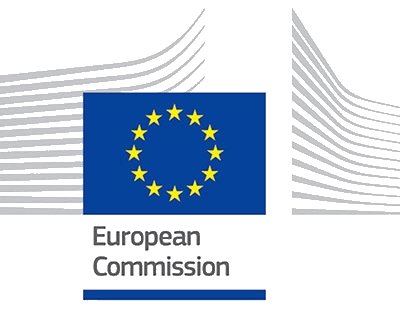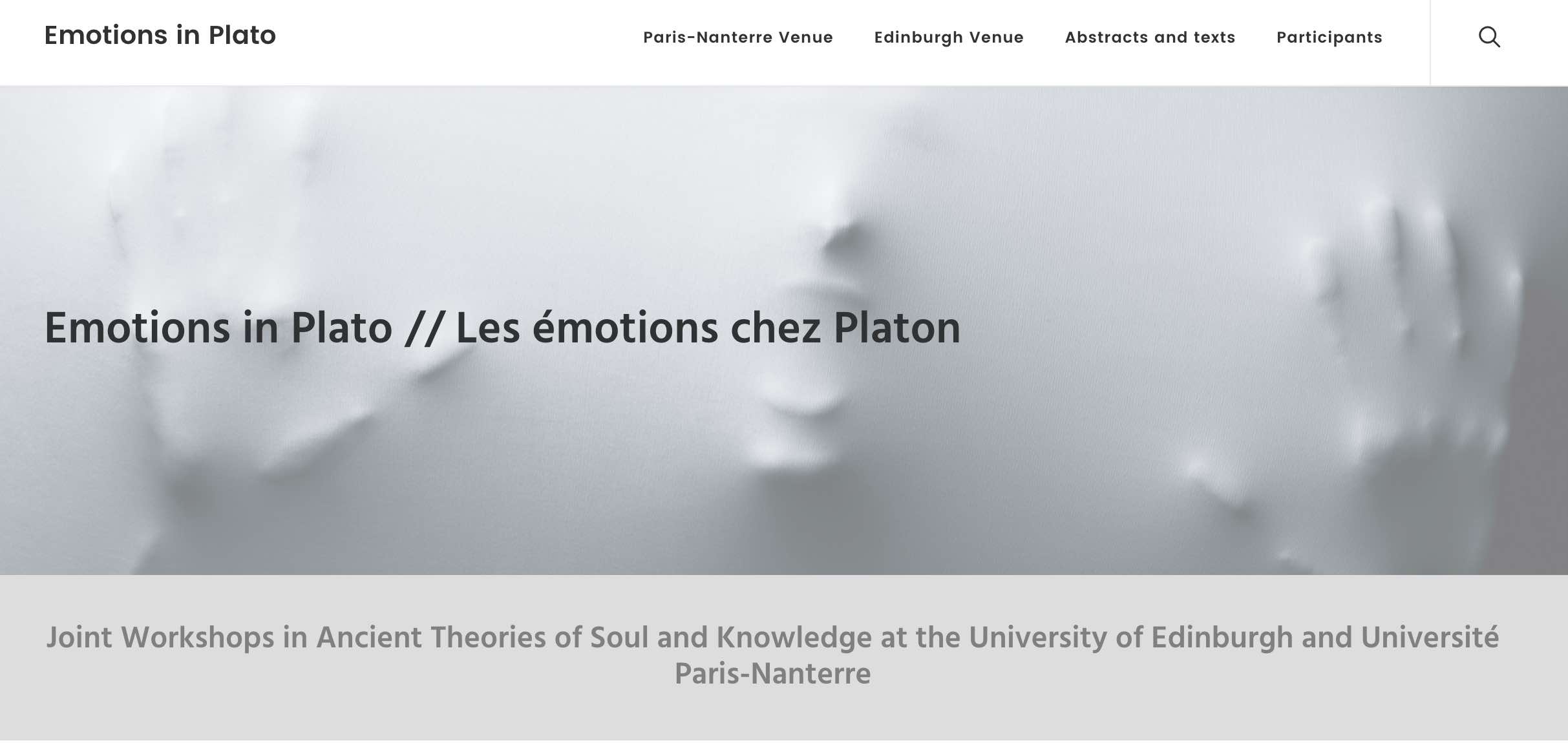Version française / Actualités
- Colloques / Journées d'études,
Appel à communication : Les émotions chez Platon // Emotions in Plato
Publié le 20 novembre 2016
–
Mis à jour le 13 mars 2018

Emotions in Plato - Joint Workshops in Ancient Theories of Soul and Knowledge at the University of Edinburgh and Université Paris-Nanterre
Date(s)
le 15 décembre 2016
Lieu(x)
Bâtiment Max Weber (W)
Emotions in Plato - Joint Workshops in Ancient Theories of Soul and Knowledge at the University of Edinburgh and Université Paris-Nanterre
Date: 17th March 2017 (Paris Nanterre) – 7th April 2017 (Edinburgh)
Deadline for proposals: 15th December 2016
Emotions have become an important topic of research in Classics, joining historical, anthropological, literary, and philosophical approaches. Specific works on emotions within the ancient philosophical corpus are however unevenly distributed, and studies on the nature and functions of emotions in Plato are still only few. A joint workshop led by Laura Candiotto (University of Edinburgh, Eidyn Centre) and Olivier Renaut (Paris-Université Paris Nanterreniversity, IREPH) is organized with the aim to bridge this gap, exploring the different available approaches on emotions within the Platonic corpus.
Three issues are going to be addressed specifically during the workshops:
1. Pathè like anger, fear, hope, envy, jealousy, etc. appear as complex psycho-physiological states in the Platonic corpus, involving pleasure and pain, perception or, even, judgements. Nevertheless, the status of these embodied pathè and mental states remains unclear in the Platonic psycho-physiology. Is the contemporary notion of emotion that we conveniently use to designate certain pathè a good model for understanding their nature and functionality?
The first issue deals with the notion of emotion, and its relevance for understanding Plato’s epistemology. What is the relationship among emotions, body, and soul? Do emotions supervene on individual mental states? Are they compounds of pleasure and pain? Which is their phenomenology, and in which contexts - public or private - is it detectable? Are emotions conceptual, and by what standard? What type of entity are they in the ontology?
2. The Western philosophical tradition has defined emotions through their opposition to reason. This opposition may find its roots in Plato, since some pathè are called "irrational" because they seem to obscure the operation of reason and disturb the soul. However, it should not be taken for granted that emotions in Plato are totally devoid of rationality. In fact, they may possess the capacity of representation, or even the faculty of understanding or computation. Moreover, some pathè may be profitably associated with what is called a "rational desire", whose purpose is the pursuit of good. Finally, whether the epistemological role of emotions might be understood as a gateway to knowledge, or at least as an adjuvant, is still an open question. A second challenge of this workshop is thus to explore the nature of Platonic pathè compared to reason and the philosophical method: Which is - if there is - their cognitive marker? How do they benefit or hinder the cognitive process of knowledge? And, more generally, which are their role and function in Plato’s psychology and anthropology?
3. The third issue concerns moral and political agency, and specifically the power or powerlessness of emotions for judging, evaluating, understanding and acting, within the Platonic account. How to define the role of emotions in the acquisition and exercise of virtue? Have they an exclusively negative function or, by contrast, are they necessary – and in which sense - for its exercise? Which are - if there are - Plato's moral and political emotions, and how do they work?
Each workshop, one in Edinburgh (date: 7th April 2017) and the other in Paris-Nanterre (17th March) will consist of 6 presentations, with two guests speakers, and four presentations resulting from the call for papers.
Please send your proposal (500 words max) to Laura Candiotto (Laura.Candiotto@ed.ac.uk) and Olivier Renaut (olivier.renaut@parisnanterre.fr), expressing your preference for participating in the Edinburgh or in the Nanterre-Paris workshop. Deadline: 15th December 2016. It is envisaged that we publish a selection of the contributions in an edited volume or journal monograph issue.
Proposals may include, for example, the following topics on Plato’s thought:
- value and the relevance of emotion for Plato’s theory of knowledge and soul;
- analysis of a particular emotion, framed within one of the Workshop’s issues;
- classification of the types and functions of emotions in Plato;
- the role of emotions in knowledge;
- emotions and intellectualism;
- emotions and desire;
- emotions, body and experience.
Language: the official language will be English or French for both the workshops. Another language among the 5 official languages of the International Plato Society (English, German, French, Italian, Spanish) would be considered under the condition of disseminating to the public the full paper's translation in English or in French.
The Joint workshop are made possible thanks to the generous funding of the Eidyn Research Centre (University of Edinburgh), and of the Doctoral School ED 139 and the Institut de Recherches Philosophiques (University of Paris-Nanterre).
----
Les émotions sont devenues un champ d’exploration important dans les études anciennes, croisant des approches historiques, anthropologiques, littéraires et philosophiques. L’intérêt porté aux émotions dans le corpus philosophique antique est pourtant inégalement réparti, et les études sur la nature, le nombre et les fonctions des émotions chez Platon demeurent encore peu nombreuses, probablement du fait que le modèle platonicien des affections nous est plus difficile à comprendre avec nos catégories contemporaines. Un atelier conjoint organisé par Laura Candiotto (Universtiy Of Edinburgh, Eidyn Center) – et Olivier Renaut (Université Paris-Nanterre, IREPH) est organisé afin d’explorer les approches disponibles sur les émotions dans le corpus platonicien.
Trois axes sont retenus spécifiquement pour cet atelier :
1. Dans le corpus platonicien, les pathè comme la colère, la peur, l’espoir, l’envie jalouse, etc. apparaissent comme des états psycho-physiologiques complexes, qui font intervenir plaisir et douleur, des représentations ou peut-être même des jugements. Liées au corps, mais également états ou mouvements de l’âme, ces pathè ont un statut dans la psycho-physiologie platonicienne qui reste à éclaircir. Notre concept d’émotion, que nous employons commodément pour désigner certaines pathè, constitue-t-il un bon modèle pour les comprendre?
Un premier enjeu de cet atelier est d’explorer la pertinence du concept d’émotion appliqué à Platon. Quel est leur leur lien exact avec le corps et l’âme? Les émotions sont-elles des survenances d’états mentaux individuels? Sont-elles des composés de plaisir et de douleur? Quelle phénoménologie employer pour les décrire, et dans quel contexte – public ou privé – sont-elles décelables? Constituent-elles même une unité conceptuelle ou réelle pour Platon et selon quel critère? Quel statut ontologique leur est-il réservé?
2. La tradition philosophique a longtemps défini les émotions à travers son opposition à la raison. Cette opposition pourrait avoir ses racines chez Platon, dans la mesure où certaines pathè sont appelées «irrationnelles» puisqu’elles semblent occulter le fonctionnement de la raison et perturber l’âme. Néanmoins, il n’est pas évident que les émotions chez Platon soient tout à fait dépourvues de faculté de représentation, voire même de compréhension ou de calcul. Plus encore, certaines pathè pourraient bien être associées à ce qu’on a appelé un «désir rationnel», dont la finalité est la poursuite du bien. Enfin, le rôle épistémologique des émotions comme voie d’accès vers la connaissance, ou du moins comme adjuvant, demeure une question ouverte. Un second enjeu de cet atelier est d’explorer la nature des pathè platonicienne par rapport à la raison et à la philosophie: quelle est – s’il en est – leur capacité cognitive? Comment les émotions promeuvent ou empêchent les processus cognitifs de connaissance? Et, plus généralement, quelle est leur place et leur pouvoir dans la psychologie et leur rôle dans l’anthropologie platonicienne?
3. Un dernier enjeu de cet atelier consiste à articuler la définition des pathè chez Platon à leur «usage» en éthique et en politique, du fait de leur puissance ou impuissance à juger, à évaluer, à comprendre. Comment définir le rôle des émotions dans l’acquisition et l’exercice de la vertu? Ont-elles une fonction exclusivement négative ou au contraire sont-elles nécessaires à son exercice? Quelles sont – s’il y en a – les émotions spécifiquement morales et politiques chez Platon, et quelle est leur fonction?
Chaque atelier, l’un à Nanterre (17 Mars 2017) et l’autre à Edinburgh (7 avril 2017) consisteront en 6 interventions, avec deux invités, et quatre interventions issues de l’appel à contribution. Envoyez votre proposition (500 mots max) à Laura Candiotto (Laura.Candiotto@ed.ac.uk) et Olivier Renaut (olivier.renaut@parisnanterre.fr) en précisant si vous souhaitez intervenir à Edinburgh ou à Nanterre.
Date limite: 15 décembre 2016. Une publication des contributions est envisageable sous la forme d’un volume ou d’un numéro de revue.
Les propositions peuvent porter par exemple sur les thèmes suivants:
- valeur et pertinence du concept d’émotion dans la théorie platonicienne de la connaissance et de l’âme.
- analyse d’une émotion en particulier, en rapport avec l’un des axes de l’atelier.
- classifications des types et des fonctions des émotions chez Platon
- rôle des émotions dans la connaissance
- émotions et intellectualisme
- émotion et désir
- émotions, corps et expérience.
Langue des interventions: les contributions peuvent être données en anglais et en français. Il est néanmoins possible de produire une contribution dans l’une des 5 langues officielles de l’International Plato Society (Anglais, Allemand, Espagnol, Italien, Français), à condition de mettre à disposition du public une traduction anglaise ou française au public.
Cet atelier est rendu possible grâce au financement de Eidyn Research Centre (University of Edinburgh), de l’Ecole doctorale ED139 et de l’Institut de Recherches Philosophiques (Université Paris-Nanterre).
Laura Candiotto (University of Edinburgh) and Olivier Renaut (Université Paris-Nanterre)
Partenaires :


Mis à jour le 13 mars 2018
Contact :
Olivier RENAUT : olivier.renaut@parisnanterre.fr








